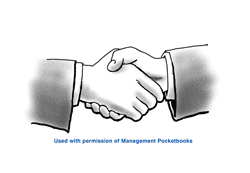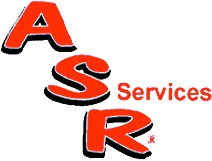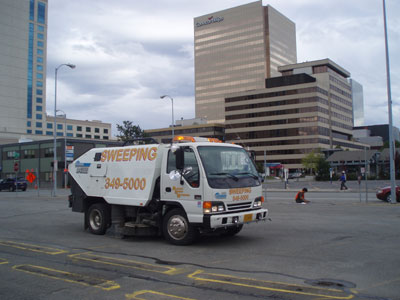
|
 |

|
 |
Sweeping a Big Part of Alaska Snow Removal's Business
With a name like Alaska Snow Removal Services — known throughout its market area as simply 'ASR' — someone might think they know all the company does. However, in this instance that's not the case.
by Ranger Kidwell-Ross It was in 1978 that Tabb Thoms started into the snow removal and abatement field in Alaska. His service was exemplary, the state gets plenty of snow and his business steadily increased. Twenty-two years later his company provided a host of related services. Power sweeping wasn't one of them. "Although we coordinated sweeping services for a number of our customers," says Thoms, "we stayed out of the business ourselves. It was in about 2000, though, that the average mall manager started to realize the value of lot sweeping. And, as one business property got swept then the neighboring managers wanted sweeping done, too. What happened is that the sweeping companies we were using started to be so busy that they couldn't always show up when we needed them. So, I decided to add power sweeping to our list of services."
"Alaska is basically a 'no salt' state," continues Thoms. "Part of the reason is environmental, but part is the fact that salt simply doesn't work at some of the lower temperatures we get to in Alaska. The upshot is we put lots of sand and gravel down for snow abatement, sometimes reaching an accumulation that will average well over 1/4". Whenever it warms up enough for the snow to melt, though, customers want the material removed for safety reasons. Often, because of the sheer amount of sand and gravel that has to be put down, by the time we get a thaw there's no way to even see the lines on the parking lots." The company uses Schwarze air machines, primarily A4000 and A7000 models. For broom sweeping the preference is for Elgin's Broom Bear line. "We have conditions more rugged than most contractors in the lower 48 can even conceive of for most all of our sweeping," says Thoms. "For example, we routinely fill up an air sweeper hopper in 100' when we're removing abatement material from a parking lot. When the sand and gravel is approaching 1/2" in depth, you don't go far without dumping. We try to use our air sweepers for it, though, except during the spring cleanup. For that, we must use broom sweepers."
Since a standard water system won't work below freezing, Thoms and his ASR management team have learned they can get by if they operate their Schwarze A4000 sweepers, because this model has hoppers that will hold water. The operators start out with water in the hoppers as a way to cut down dust and fan abrasion. Below 19-degrees, though, any water in the hopper freezes and creates both a mess and excessive fan wear. When the temperatures are below 19-degrees but above 10-degrees, ASR management adds a blend of potassium acetate (commonly called "E36") to sweeper water systems. Under 10-degrees the E36 must be used straight. That system allows operation at very low temperatures without ruining the sweepers quickly due to abrasion. Especially toward the end of winter, the sand will have been ground down to a fine powdery dust that will ruin the sweeper fan if something isn't done for dust suppression. Plus, Thoms said, just turning the sweeper on in a parking lot will create a dust storm that hides the machine within seconds. The Anchorage area also has periodic volcanic ash events. When these occur there is little visibility, yet sweepers are one of the first machines that are used in recovery. Plus, the ash can be very destructive to both sweeper operator breathing and the engines of their machines. "It's like a thick black fog and totally shuts down the city," says Thoms. "The events can take months to recover from. Even when the pavement has gotten cleaned, since all the ground has ash on it, the pavement surface gets covered again over and over with even the slightest wind.
The E36 blend is much more efficient than water, though at about $7/gallon the chemical is extremely expensive. Keep in mind we are injecting it into the airflow of the sweeper, though, not putting it onto the ground. However, when compared to using water during an ash event, the result you see is like the difference between washing your dishes with soap or without. Spring sweeps generally require use of the company's mechanical broom fleet, since the material to clean up is so excessive. "Our curbs are 6-to-8 inches tall and they will often be completely covered up by the time we get our spring thaw and can do our end-of-winter cleanup for parking lots," says Thoms. "Everyone wants to minimize that gravel from getting down the storm drains when the snow all starts to melt, so we have to be as aggressive as possible in getting rid of it. People who haven't been in this part of the country wouldn't believe how much material there is to handle."
It would have been funny if it wasn't so expensive. Instead of dumping after the first 100' like he should have, he tried to pick up the entire parking lot worth of material. He came back with the hopper filled up to the screen, without even knowing it, and then complained that the sweeper wouldn't pick up right. Probably the only reason the mechanics and management team even found out what actually happened is that the guy tried to dump his load. Of course, there was no way; just trying broke the hydraulic lift ram where it pinned to the chassis. That was expensive, both in terms of money out the door and expensive downtime. Plus, up here any unplanned-for breakdowns take longer and are more expensive than elsewhere. It's more costly to get parts up here than to anywhere else in the country. Even our regular freight costs are sometimes as much as 50% to 100% or more of the cost of the part itself. When we have to get delivery overnight, the cost is astronomical."
"Everyone raised their hands, of course. He then talked about how to position your company so it's the very best, working for the best customers; those who appreciate your quality of work and pay you for it in a timely fashion. I determined that's the kind of company I wanted to operate. Today, that business model fits ASR completely, for not just snow removal and sweeping, but for everything we do." Upon returning from the seminar, Thoms and his management team determined they no longer wanted to handle residential customers. By focusing on commercial accounts, Thoms realized they could have a company that would be able to stay busy year around. "Although the residential folks were great people — some represented three generations of family — each required an individual snow removal invoice for each service instance and were only customers with us only for a few times in the winter." The upshot was that ASR 'fired' 624 residential customers by notifying them they would need to find another provider within a year's time. The management team also decided to quit servicing condo associations. Because each of those properties tended to have several self-styled bosses, Thoms said, there was little likelihood of pleasing them all. The condo managers kept changing, too, so no matter how good a job they did the ASR team had to continually re-prove themselves as a company. "We were only a bill with most of them," remembers Thoms, "and their payments often stretched as long as 6 months. As a replacement for its 'lost' customers, ASR initially targeted medical facilities. These wanted a great job done, were appreciative when it occurred, and were happy to pay the price for exemplary service. Added through the intervening years, many other of that type of businesses now make up the ASR service roster.
In his audio interview, Thoms discusses in detail the rugged manner in which his business necessarily operates in the harsh Alaskan conditions. In addition to the items touched upon in this written article, Thoms also talks about the hybrid pavement machine/broom sweeper they worked with other sweeping companies to fabricate. It sweeps like a broom sweeper but loads the sweepings directly into a dump truck on-the-fly. He also discusses the camaraderie that has developed in their ASR teams, which compete to see who can do their jobs the best. "Most companies will have employees trying to do the least they can," relates Thoms. "I couldn't be more proud of the job everyone in ASR does for our customers and our organization."
|
© 2005 - 2012 World Sweeper
|
Featured Contractors' Contents
|